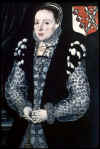John CHEKE (Sir Knight) (original) (raw)
**Sir John CHEKE, Knight
| Born: ABT 16 Jun 1514 Died: 13 Sep 1557, London, Middlesex, England Father: Peter CHEKE (Esq.) Mother: Agnes DUFFIELD Married: Mary HILL (b. 1532 - d. 30 Nov 1616) (dau. of Richard Hill and Elizabeth Isley) ABT 1547 |  |
|---|
Children:
1. Henry CHEKE (b. ABT 1548 - d. 1586)
2. John CHEKE (b. 1549 - d. 1580)
3. Edward CHEKE (b. 1550 - d. 1563)
Sir John Cheke Radio Times Hulton Picture Library
English classical scholar, was the son of Peter Cheke, esquire-bedell of Cambridge University. He was educated at St Johns College, Cambridge, where he became a fellow in 1529. While there he adopted the principles of the Reformation. His learning gained him an exhibition from the King, and in 1540, on Henry VIII's foundation of the regius professorships, he was elected to the chair of Greek.
Amongst his pupils at St Johns were William Cecil, who married Cheke sisterMary, and Roger Ascham, who in 'The Schoolmaster' gives Cheke the highest praise for scholarship and character. Together with Sir Thomas Smith, he introduced a new method of Greek pronunciation very similar to that commonly used in England in the 19th century. It was strenuously opposed in the University, where the continental method prevailed, and Bishop Gardiner, as Chancellor, issued a decree against it on Jun 1542; but Cheke ultimately triumphed. On the 10 Jul 1554, he was chosen as tutor to Prince Edward, and after his pupils accession to the throne he continued his instructions.
| On 11 May 1547 Cheke married Mary, dau. of Richard Hill of Hartley Wintney, Hampshire (b. 1500 - d. 1539), sergeant of the wine-cellar to Henry VIII, and Elizabeth Isley (b. 1510 - d. AFT 1566). By 1539, Mary's mother was trying to place her in the household of Elizabeth Tudor and according to the Oxford DNB ("Cheke, John"), she did join that household in 1546. Other sources place her, as a young girl, in the household of Anne Stanhope, Countess of Hertford (later duchess of Somerset) and say it was there she met Sir John Cheke. In the winter of 1549, Mary somehow displeased the duchess, prompting Cheke to write a letter of apology on 27 Jan 1549/50. In it he tells the Duchess that he has urged Mary to �be plain� and hopes that Mary�s �_honest nature_� will �_content_� the Duchess. He also blamedMary's behavior on the fact that she was pregnant. Cheke took a fairly active share in public life; he sat, as member for Bletchingley, for the parliaments of 1547 and 1552-1553; he was made provost of Kings College, Cambridge (1 Apr 1548), was one of the commissioners for visiting that university as well as Oxford and Eton, and was appointed with seven divines to draw up a body of laws for the governance of the church. On 11 Oct 1551 he was knighted; in 1553 he was made one of the secretaries of state, and sworn of the privy council. His zeal for Protestantism induced him to follow the Duke of Northumberland, and he filled the office of secretary of state for Lady Jane Grey during her nine days reign. In consequence Mary threw him into the Tower on 27 Jul 1553, and confiscated his wealth. He was, however, released on 3 Sep 1554, and granted permission to travel abroad. Cheke fled the country, leaving his family behind. On 4 Apr, he wrote from Calais to his friend, John Harrington, asking him to look after his wife. He went first to Basel, then visited Italy, giving lectures in Greek at Padua, and finally settled at Strassburg, teaching Greek for his living. In the spring of 1556 he visited Brussels at the invitation of Sir John Mason, Mary Hill�s stepfather and the Queen�s ambassador, to see his wife. |  Mary Hill portrait by the Circle of Gower, c.1585-1590 Mary Hill portrait by the Circle of Gower, c.1585-1590 John Chekeby tan unknown artistPrivate Collection John Chekeby tan unknown artistPrivate Collection |
|---|
On 15 May, in his way back, between Brussels and Antwerp, he and Sir Peter Carew were treacherously seized by order of**Felipe of Spain**, hurried over to England to stand trial for heresy, and imprisoned in the Tower on 1 Jun. On 7 Jul, his wife Mary was allowed to visit him and stay the night. Cheke was visited by two priests and by Dr. John Feckenham, dean of St Pauls, whom he had formerly tried to convert to Protestantism, and, terrified by a threat of the stake, he gave way and was received into the Church of Rome by Cardinal Pole, being cruelly forced to make two public recantations.
When he was released, he went to live with a nephew by marriage, Peter Osborne. Overcome with shame, he did not long survive, but died in London on 13 Sep 1557, carrying, as T. Fuller says (Church History), 'Gods pardon and all good mens pity along with him'.
Widowed, Mary Hill left her sons with Osborne to be raised. According to the DNB, she was left well-to-do, with plate valued at �666 13s. 4d., jewels worth �533 6s. 8d., and household goods worth �400. Her second husband was Henry MacWilliams (b. 1532 - d. Dec 1586), a gentleman at the court of Elizabeth, by whom she had one son, Henry, and five daughters, Margaret (b. 1560 - d. 1640), Susan, Ambrosia, Cassandra, Cecily. Mary was a lady of the Privy Chamber and received a number of valuable grants from the Queen and became quite wealthy. She was buried in St. Martin�s-in-the-fields.
John Cheke and Mary Hill had three sons. The descendants of one of these, Henry, known only for his translation of an Italian morality play Freewyl (Tragedio del Libero Arbitrio) by Nigri de Bassano, settled at Pyrgo in Essex.
